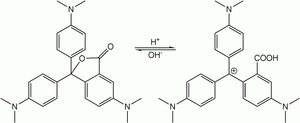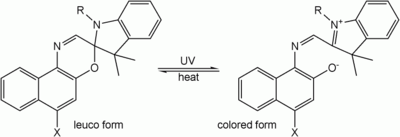Leuco dye


A leuco dye is a dye whose molecules can acquire two forms, one of which is colorless.
For example, the spiro form of an oxazine is a colorless leuco dye; the conjugated system of the oxazine and another aromatic part of the molecule is separated by an sp3-hybridized "spiro" carbon. After protonating a part of the molecule, irradiation with UV light (see Photochromism), or introducing other kind of such change, the bond between the spiro carbon and the oxazine interrupts, the ring opens, the spiro carbon achieves sp2 hybridization and becomes planar, the aromatic group rotates, aligns its π-orbitals with the rest of the molecule, and a conjugated system forms, with ability to absorb photons of visible light, and therefore appear colorful.
Another example of a leuco dye is the crystal violet lactone, which in its lactone form is colorless or slightly yellowish, but in low pH, when it is protonated, it becomes intensely violet. Other examples are phenolphthalein and thymolphthalein, colorless in acidic to neutral pH, but becoming pink and blue in alkaline environment. Other example are many redox indicators, which undergo reversible color change between colored and colorless form at a specific electrode potential.
Leuco dyes are a key component of some thermochromic dyes and thermal printer papers, photochromic materials, and of the Flexplay DVD discs with limited play time, where the leuco form of methylene blue is used.
See also
- Flexplay, trademark for a DVD-compatible optical video disk format that uses leuco dye to intentionally "wear away" after a limited number of playings.
- Hypercolor, clothing that changes color with heat